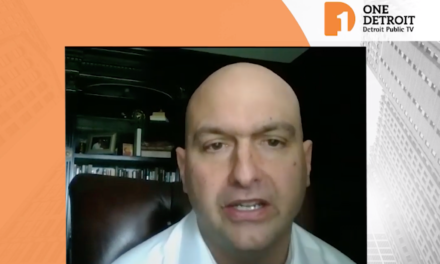The Detroit Public Theatre’s TAG Residency brings yet another story with real-world implications to the forefront for audiences to enjoy this summer. With its unique blend of humor, vulnerability and thought-provoking storytelling, Satori Shakoor’s solo theater debut, “Confessions of a Menopausal Femme Fatale,” delves into the experiences of women navigating the challenges of menopause in their lives. It will be performed at Detroit Public Theatre for one weekend only, July 21-23.
Throughout the play, Shakoor masterfully addresses several themes relevant to women’s experiences during menopause. Not only does it speak on the physical symptoms, but the mental and emotional toll women often face through the process, as well as the societal stigmatization around femininity and aging. “Confessions will encourage women to break the silence, end the shame and inspire conversations that are uplifting, informative, thought-provoking and supportive,” the Detroit Public Theatre said.
Shakoor, the founder of The Secret Society of Twisted Storytellers and a contributor to One Detroit, joined contributing producer Sarah Zientarski to talk about the inspiration behind her monologue. Plus, “Confessions of a Menopausal Femme Fatale” Director Jonathan Jewell-Chatten talks about the barrier-breaking impact Shakoor’s production can have on audiences.
Full Transcript:
[Spoken word]: The summer of 99. I’m living in Toronto at the time. I am a hot, 45, fit.
Satori Shakoor, Writer, Executive Producer, Lyricist, Confessions of a Menopausal Femme Fatale: When people tell their stories, they automatically create a community in the wake of their words.
[Spoken word]: Biological clock is ticking, pushing me in directions I don’t want to go. I’m a cougar, a man-eater, a femme fatale.
Satori Shakoor: I come from a long line of storytellers, all black women from Alabama, Mississippi, Jim Crow South, and that’s how they use storytelling to teach, to warn, to entertain, to impart. I am the producer and the founder of The Secret Society of Twisted Storytellers, which is a live storytelling event. I always say, until you tell your story, we can never know your glory, your greatness, your trials and tribulations. So we need each other to show us how we get through struggles, through challenges, through good times and bad. I wanted to come out and tell this story, “Confessions of a Menopausal Femme Fatale,” to extend my story to the world.
[Spoken word]: I’m betwixt and between. I start to notice things like, all of a sudden I’m hot. Jump out of my skin, hot, can’t sleep, night sweats, chills. When I was first noticing the symptoms of menopause, they call it perimenopause. I wasn’t able to recognize myself. I was having mood swings. These hot flashes would happen.
And when I asked around, older women who would have been able to tell me, they would say, “Oh, I don’t remember.’ My mother says, “I don’t remember.” Women who were older didn’t want to admit that they were at this stage or age of life, and so there was no information. So I wanted to write about it then, but I hadn’t gone through it. So now on this side, I have a perspective and now I can share that journey that I took.
Jonathan Jewell-Chatten, Director, Confessions of a Menopausal Femme Fatale: I believe it is courageous, what she’s doing, because people don’t talk about it. They’re shy or embarrassed to talk about some things. And she’s really taken that first step, I believe, for a lot of people, men and women, to have these conversations that should be normal for society.
Satori Shakoor: It’s scary. Oh, you at the beginning of the change of life. What I really want to do with this show, besides tell my story, is to remove the stigma and honor. It should be a rite of passage. In other cultures, it may be a rite of passage, but here we want to be youthful, and we can be youthful for a long time. But youth is a state of mind, and wisdom is something you earn, and you pay for with your life, with the blood, sweat, and tears of your life.
[Spoken word]: Because I’m alive. I’m alive. We begin last year when my husband and I are boarding the plane to go to Hawaii, to the island of O’ahu, and I have a panic attack on the plane, which isn’t really a panic attack. It just triggers memories of when I left Detroit to go to Hawaii, changed my name, and, basically, committed a crime that I was trying to forget and escape from.
So I realized before we take off, I’m going back to resurrect and reclaim this former self. My name used to be Jeanette Magruder when I was with P-Funk and that whole past. So I’m going back to resurrect and reclaim, forgive, and integrate that part of my life so that I can have full power. And I go— And then we flash back to these symptoms of perimenopause, and we move forward to what I learned in the end.
Well, at first, his words, they hurt me. They take the wind right out of my sails. I’m too much? And then it sinks in what he’s saying. I’m too much. That means I’m not dead. I’m not complacent. See, because I’m going for being way too much. I’m going for being over the top alive.
Jonathan Jewell-Chatten: Her stories that she’s going to be telling throughout her performance, I believe everyone is going to resonate. There’s many funny moments. One of my favorite moments is almost like it’s the moment where she’s reclaiming her womanhood because of another man’s assumptions about her. And it is hilarious.
Satori Shakoor: I made it a solo standup storytelling concert because I wanted to incorporate everything that I am. I’m a stand-up comedian. I’m a singer. I’m a storyteller. It has music, songs, it has comedy, it has tragedy. It has all the elements of a powerful story.
[Spoken word]: If I’m too much, why not go for being way too much? All of the storytelling songs, I wrote those songs. There’s different styles and moods of music which help to tell the story and have the emotional position that I’m in at the time.
Jonathan Jewell-Chatten: Really, her voice, I would say, is even more musical than the music itself. People should come to the show because they’re going to be entertained. They’re going to get a great story. They’re going to laugh. They may cry. They’re going to be shocked. They are going to be sad. They’re going to feel all— the full range of emotions, they’re going to feel in this show.
Satori Shakoor: I hope they take some part of my story and allow it to make a difference. To let it ruminate, let it free them. You don’t have to be ashamed or uncomfortable about being a woman and being at this powerful powerful stage of life with all these other years ahead of you, if you’re lucky.
[Spoken word]: I’m too much.
Stay Connected:
Subscribe to One Detroit’s YouTube Channel & Don’t miss One Detroit Mondays and Thursdays at 7:30 p.m. on Detroit Public TV, WTVS-Channel 56.
Catch the daily conversations on our website, Facebook, Twitter @DPTVOneDetroit, and Instagram @One.Detroit
View Past Episodes >
Watch One Detroit every Monday and Thursday at 7:30 p.m. ET on Detroit Public TV on Detroit Public TV, WTVS-Channel 56.




